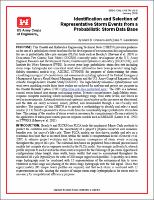Please use this identifier to cite or link to this item:
https://hdl.handle.net/11681/26341Full metadata record
| DC Field | Value | Language |
|---|---|---|
| dc.contributor.author | Gravens, Mark B. | - |
| dc.contributor.author | Sanderson, Dylan R. | - |
| dc.date.accessioned | 2018-01-29T14:45:34Z | - |
| dc.date.available | 2018-01-29T14:45:34Z | - |
| dc.date.issued | 2018-01 | - |
| dc.identifier.govdoc | ERDC/CHL CHETN-VIII-9 | - |
| dc.identifier.uri | http://hdl.handle.net/11681/26341 | - |
| dc.identifier.uri | http://dx.doi.org/10.21079/11681/26341 | - |
| dc.description | Technical Note | - |
| dc.description.abstract | This Coastal and Hydraulics Engineering Technical Note (CHETN) provides guidance on the use of a probabilistic storm data base for the development of environmental forcing information for use in probabilistic life-cycle analysis (PLCA) tools such as Beach-fx (Gravens et al. 2007) or Generation Two Coastal Risk Model (G2CRM) (currently under development at the U.S. Army Engineer Research and Development Center, Coastal and Hydraulics Laboratory [ERDC-CHL], and Institute for Water Resources [IWR]). In recent years large probabilistic storm data sets including storm surge hydrographs and coincident wind wave information have been generated using high-fidelity numerical models (e.g., ADCIRC, STWAVE) for purposes of characterizing the storm climatology in support of coastal storm risk assessments including updates of the Federal Emergency Management Agency Flood Hazard Mapping Program and the U.S. Army Corps of Engineers North Atlantic Comprehensive Coastal Study (NACCS). The high-fidelity numerical hydrodynamic and wind wave modeling results from these studies are archived for analysis and project use purposes in the Coastal Hazards System (CHS) (https://chs.erdc.dren.mil/default.aspx). The CHS is a national, coastal, storm-hazard data storage and mining system. It stores comprehensive, high-fidelity, storm-response computer modeling results including climatology, surge, total water levels, and waves as well as measurements. Extremal statistics and epistemic uncertainties on the processes are also stored, and the data are easily accessed, mined, plotted, and downloaded through a user-friendly web interface. The purpose of this CHETN is to provide a methodology to identify and select a small number (12 to 36) of representative storm events from the considerably larger probabilistic storm data base. This paring of the number of storm events is necessary for computational efficiency related to the application of subsequent coastal process response models such as SBEACH (Larson et al. 1990) or STWAVE (Massey et al. 2011). | en_US |
| dc.language.iso | en | en_US |
| dc.publisher | Coastal and Hydraulics Laboratory (U.S.) | en_US |
| dc.publisher | Engineer Research and Development Center (U.S.) | en_US |
| dc.relation.ispartofseries | Technical Note (Engineer Research and Development Center (U.S.)) ; no. ERDC/CHL CHETN-VIII-9 | - |
| dc.subject | Storms--Databases | en_US |
| dc.title | Identification and selection of representative storm events from a probabilistic storm data base | en_US |
| dc.type | Report | en_US |
| Appears in Collections: | Technical Note | |
Files in This Item:
| File | Description | Size | Format | |
|---|---|---|---|---|
| ERDC-CHL CHETN-VIII-9.pdf | 2.69 MB | Adobe PDF |  View/Open |